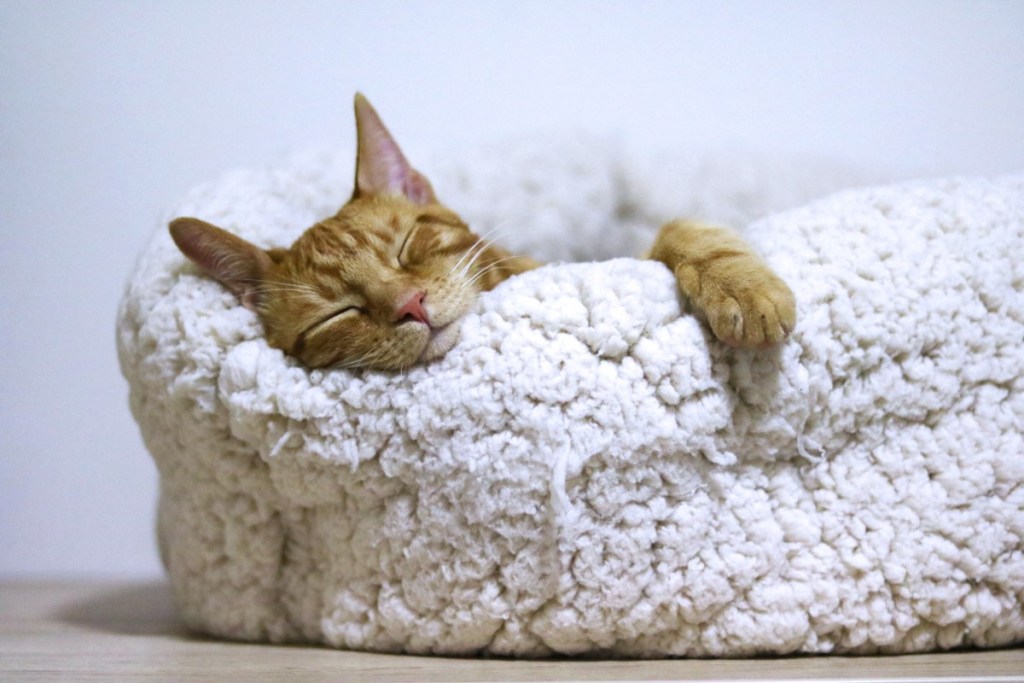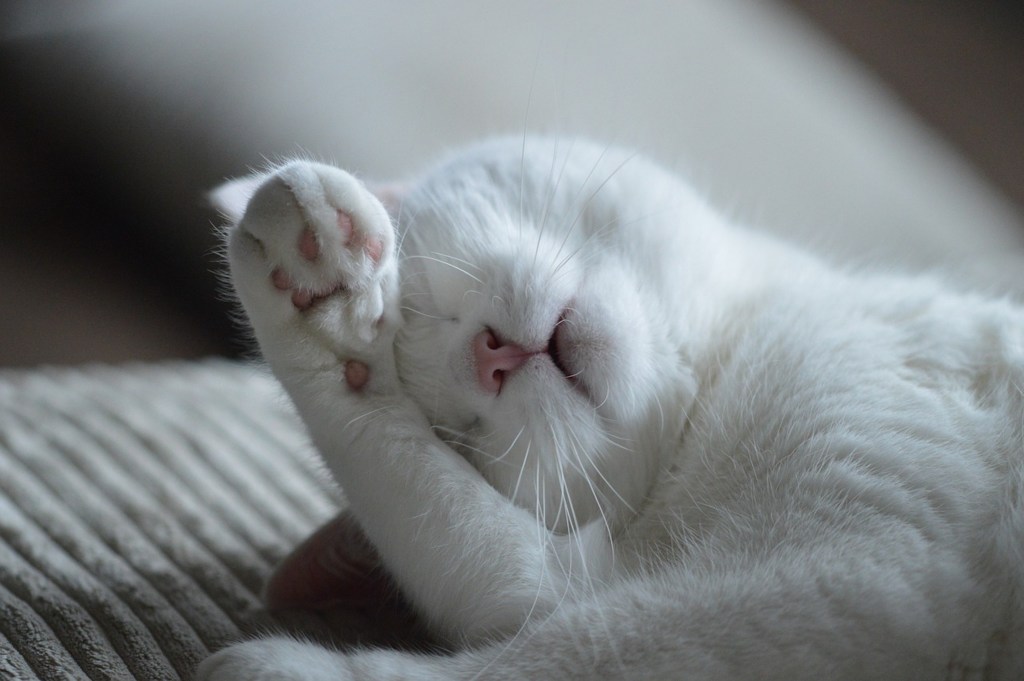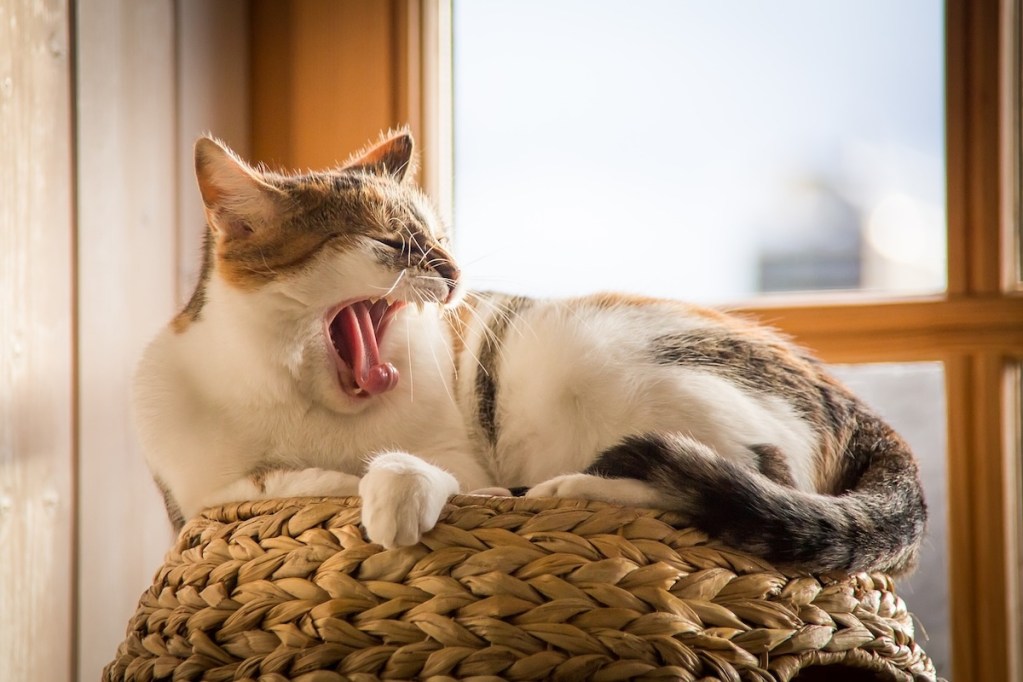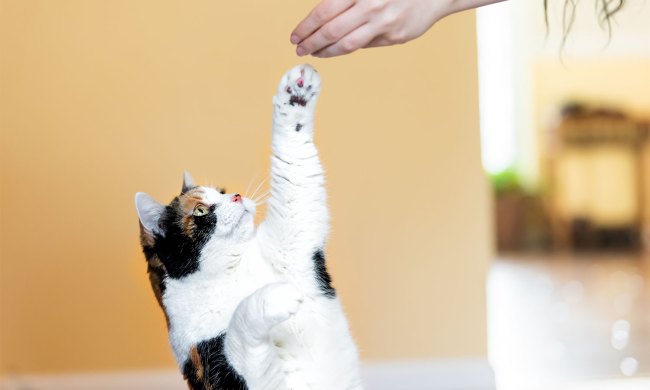You love your cat. If you could spend all day with them, you would. However, you don’t want to spend all night listening to them meow at your feet or batting items off your shelves.
It’s human nature to want to sleep at night — literally. Your natural circadian rhythm tells your body and mind to sleep when it’s dark out. Your feline friends don’t follow this pattern, though. Cats are crepuscular, meaning they’re most alert at dawn and dusk, so they are naturally more rambunctious at nighttime.
Evolution is out of your control. However, just like humans can get used to working overnight shifts, it’s possible to train your cat to stay awake during the day and catch her z’s when you do. Here are some expert-backed tips on how to get your cat to sleep at night.
Why your cat might be keeping you up all night

A cat’s instinct isn’t the only trigger keeping them (and you) up at night. Here are some common reasons why your cat may start bugging you as you try to catch some shut-eye.
- Your cat is hungry. Does your cat take the whole midnight snack idea a little too literally? There’s a chance Kitty is hungry if their bowl is empty.
- Your cat is wired. If your cat was home alone or stationary all day, they may have a ton of pent-up energy. Unfortunately, they might decide to burn it off by tearing through the house and waking you up or insisting you play with them.
- Your cat is bored. Some cats aren’t content to quietly hang out or entertain themselves. They may find it fun to knock items off tabletops or want you to turn on their laser pointer for a rousing play session.
Tips for getting your cat to sleep at night

Yes, it’s possible to get your cat to sleep when you sleep (at night). Try these tips to shift your kitty’s bedtime habits.
Play with them
Cats typically sleep during the day. To alter nighttime habits, you’ll want to change their daily schedule. Playing and engaging with your kitty will keep them active (try throwing crinkle balls or breaking out their favorite fish pole). It will also help them burn off energy so they are tired at night.
Keep the environment stimulating during the day
It’s not always possible to play with your cat during the day, especially if you work or have errands to run. You can make up for this by providing plenty for your cat to do while you’re gone:
- Battery-operated motion toys that entertain your kitty.
- A window perch so your cat can “watch TV” (in other words, chirp at the wildlife outside). Attract more of it by putting a bird feeder near the window perch.
- Puzzle feeder toys.
Reduce catnaps
Cats love short naps so much that we humans nicknamed them “catnaps.” However, you’ll want to limit the amount of time your kitty snoozes during the day, particularly in the hours leading up to your bedtime. Engaging with your feline is a fun way to keep them up and at ‘em.
Keep your kitty full
Ensure your cat is getting enough nutrition during the day so they don’t feel the need to nosh all night. That said, if your furry friend keeps waking up for a middle-of-the-night snack, opt for an auto feeder to ensure there’s food for them. That way, they can eat and get back to sleep without needing you. Consult your veterinarian about how much to feed your cat.
Give them space
Though snuggling your cat to sleep sounds positively heavenly in theory, it may not work in reality. If your cat is allowed in your room at night, the temptation to try to get your attention may be too much. Consider giving them a sleep space outside of your room so the two of you can be well-rested for the next day’s fun.
Keep it positive
Though you may be crankier than Grumpy Cat when your pet wakes you up at night, punishment is not the answer. If the punishment is mild, your cat may simply take it as a win — they got the attention they wanted. Hard punishment might make your animal fearful, affect your bond, and lead to aggression. Stick to positive reinforcement, like play during the day.
Should I leave a light on for my cat overnight?

This is a little tricky. For the most part, you shouldn’t. Even though cats thrive in the dark, they will find a bright light stimulating or uncomfortable, you presumably would be up at night as well. Remember, cats have night vision far superior to our own and certainly don’t need any extra brightness for normal activity.
However, some owners find that very low light can actually have a calming effect on your pet. Try it out and discover how your beastie responds (with a pet cam if necessary). There’s one exception to this: Make sure your kitty’s litter box is easy to spot. You could leave a dim light on only in that room if it helps your mouser find where to go.
Final thoughts on cat sleep

Figuring out how to get a cat to sleep at night is tricky. Cats love 6 a.m. and 6 p.m. — it’s how they’ve evolved. Humans, on the other hand, need to sleep firmly during the night hours. You are not necessarily doomed to years of listening to your cat meow at your door at 3 a.m. every morning, though. It’s possible to shift their sleep schedule.
Make sure your cat has stimulation during the day. If you work outside the home, provide a fun environment with toys and food puzzles. Try to reduce catnaps, particularly during the evening hours before your bedtime. Playing with them can keep them awake and tire them out. Finally, you may need to accept your cat as they are to some extent. They may wake up earlier or go to bed later than you do. Ensuring they have what they need, including food and entertainment, can minimize disruption.




